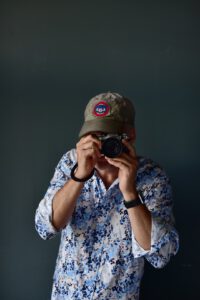I experience this every now and then in my studio: as soon as I point the camera at my counterpart – until then likeable, open, self-confident, strong – they tense up, and their facial expression suddenly becomes rigid and mask-like.
Why?
Do you also feel a little uncomfortable in front of the camera and think:
- I am unphotogenic.
- What do I do with my hands now?
- That feels strange.
- What do I look like?
Good news: this is normal – and can easily be changed.
It’s not about being “photogenic”. It’s about
- some guidance,
- a few simple techniques and
- Your inner focus.
It’s about presence instead of posturing – about calm instead of control.
Why we get nervous
A camera triggers attention – and evaluation. Our nervous system reacts as if we were about to speak in front of a large audience. That suits very few people.
What happens is tension:
– the shoulders pull up
– our facial expressions freeze
– the hands don’t know where to go
– cramping
And it is precisely this moment that often ends up in the photo.
We look more insecure, more distant, more unnatural than we are in these pictures. The result: we don’t like the photos – and avoid taking any more.
But:
You can take countermeasures.
I’ll help you.
It’s not about becoming “photogenic”.
The aim is to appear calm, clear and present.
Position & attitude
How you stand directly influences how you are perceived – both physically and internally.
In practical terms, this means:
– feet stable on the floor
– shift your weight slightly onto one leg
– gently lift your sternum
– think loosely upwards with the back of your head
– shoulders back and consciously let go
Your thought: Something you are really proud of.
This creates calm and body awareness.
Face & Expression
Many freeze as soon as the camera looks at them – or pretend to. The result: a mask, rigidity, distance.
The trick is to keep moving – even internally.
– Turn your head slightly
– Keep your gaze lively
– Jaw loose, lips soft
– Micro-smile instead of a mask smile
Your thought: A situation in which you felt strong and comfortable.
Practical tip:
Take a deep breath – then look into the camera.
This creates real calm in your gaze.
Hands & arms
If you don’t know where to put your hands, it’s a sign of tension. Hands say a lot about control and composure. When you use them, naturalness emerges.
Good options are:
– hang loosely, relaxed
– put one hand relaxed in your trouser pocket
– put your hands on the belt loop
– hold an object (e.g. glasses, notebook)
– straighten your shirt sleeve
– lean on the table
– let it rest lightly against your body
Simply loosen up
There are simple ways to get rid of tension:
– Shake yourself – simply shake your body
– Breathe in & out calmly: inhale – hold – exhale – pause
– Loosen your jaw: yawn, close your lips, place your tongue against your upper incisors
– Reset your shoulders: pull them up, hold them briefly, let them fall back
– Your thought: “I’m in the right place right now.”
These small movements release tension and immediately change energy and expression.
Your mini-exercise before the shoot
Shortly before the shoot, you can actively “switch on” yourself and your body:
– loosen your lips and cheeks
– consciously yawn or smile
– feel your feet, loosen your shoulders
– close your eyes, breathe calmly
– warm up in small steps
Helps to find peace and presence.
A good portrait is not created by chance
I will give you clear guidance, honest feedback and enough space to find yourself. You will not be left alone with me.
I ask you questions such as:
– How do you want to come across?
– What do you want to achieve with the image?
– What impression, what feeling do you want the viewer to have?
Then we’ll create your picture together – step by step.
You don’t have to play anything. You can just be yourself – and I’ll make sure that the picture shows exactly that.
Conclusion
Confidence in front of the camera has little to do with being “photogenic”.
It arises when body, posture and inner focus fit together:
– Calmness in the body
– clarity in posture and facial expressions
– a genuine inner standpoint
– and professional guidance
The result: pictures that show you as people experience you – real, clear, present.


